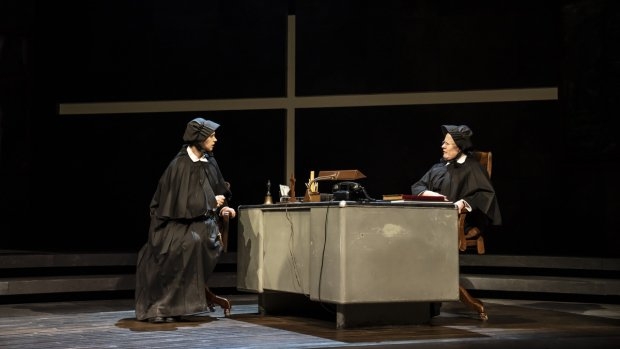Doubt at Chichester Festival Theatre – review
Monica Dolan stars in Lia Williams’ “masterpiece” revival

© Johan Persson
Like good wines, good plays get richer with time. John Patrick Shanley's Doubt, written in 2004 and set in 1964, just after the assassination of President Kennedy cast America's belief in its gleaming future into shadow, shifts and changes in front of our eyes, challenging our deepest beliefs, asking us to question everything. In an age of polarised opinions, and cancel culture certainties, it feels more essential than ever.
It is set in an old-fashioned Catholic school in the Bronx where Sister Aloysius rules with a rod of iron, holding fast to the old ways and resisting the liberal instincts of the priest Father Flynn, who does things like playing basketball with the boys and suggesting the inclusion of Frosty the Snowman in the Christmas pageant. "It's heretical," Monica Dolan's Sister Aloysius exclaims, her mouth pursuing in indignant disgust.
Her dislike fuels her conviction that Father Flynn is abusing a young boy called Donald Muller, the only black boy in the school and thus a beacon for the kind of progressive change that the priest embodies. He denies the accusations, but she persists, rejecting his claim that he was merely being kind to the boy. "It is my job to outshine the fox," she tells Sister James, her young colleague who believes she is seeing wrong where none exists.
The to-and-fro of the argument between Sister Aloysius's self-righteous certainty – "I know people" – and Flynn's pleas for tolerance, openness, and the allowance of religious doubt, is the thrust of the play's theme as well as of its narrative. Each challenges the other, in a series of long, engrossing scenes that feel like battlefronts, the dialogue as crisp and cutting as flashing swords.
The play's pertinence in the light of the abuse scandals in the Catholic Church is sharp; if more people had had the courage to take on the power of the priesthood and called out suspicious behaviour, less harm would have been done. Yet the balance never swings fully in either direction; this is a parable, a philosophical debate as much as a story.
Lia Williams' direction is a masterpiece of rising tension and fierce control. She highlights the inherent sexism of a system where nuns were not allowed to challenge the men in charge, by the simple act of letting Sam Spruell's easily-entitled Father Flynn automatically take Sister Aloysius's seat when she asks him to a meeting. His exertion of his authority and physical heft as the intensity of their arguments increases makes her determination both more explicable and more admirable.
The constant flow of the argument and of moral weight in the play is infinitely assisted by a remarkable stark setting by Joanna Scotcher that seems to push the Chichester Festival's stage out like an accusing finger, its black domain illuminated by Paul Keoghan's slim, bright cross of light. It's a superbly simple piece of design, cleverly assisted by Melanie Pappenheim and Giles Pering's subtle soundscape.
Within this carefully structured arena, the cast duck and spar. Dolan's Sister Aloysius is extraordinary; realistic, pugnacious, unlikeable, but sometimes surprisingly funny, she seems puffed up by the ferocity of her zeal. Every twitch of her mouth or sweep of her hand is utterly believable.
Spruell is finally cast as the charismatic Flynn; you warm to the questioning quality of his sermons and the compassion of his actions but there's a toughness to him too, a certain slippery arrogance. There's excellent support too from Jessica Rhodes as the innocent young nun struggling with her own vocation and particularly from Rebecca Scroggs' fiery Mrs Muller whose willingness to try to save her son in surprising ways is one of the play's many unexpected twists.
"You may think you're doing good, but the world's a hard place," she says. Doubt addresses all the tension of that statement, never letting the audience settle into easy assumptions or complacent certainties. It's only 90-minutes long, but the complexity of its arguments rings out long after it is over. Terrific.













